Overview
If you’re looking for a holistic approach to anxiety, essential oils could hold the key.
Essential Oils For Anxiety
Characteristics such as genetics, stress, and environmental factors are believed to contribute to anxiety. The main treatments for anxiety disorders are psychotherapy, medication, or both.
Aromatherapy is often used as a supplementary remedy for anxiety through topical applications and inhalation.
Always Consult a Doctor Before Using Essential Oils For Treating Health Conditions.
What essential oils are good for anxiety?
If you’re looking for a holistic approach and are thinking of using essential oils for anxiety, there are numerous essential oils for anxiety, but here are 25 of the best essential oils for mental health.
1. Valerian Essential Oil

Valerian is a flowering plant that is native to Europe and Asia and has been traditionally used since the ancient world. It’s known for its grounding abilities. Valerian is one of the best oils for anxiety.
Valerian oil blend with holy basil or rose oil.
Scent Profile: Woody and balsamic
2. Lavender Essential Oil
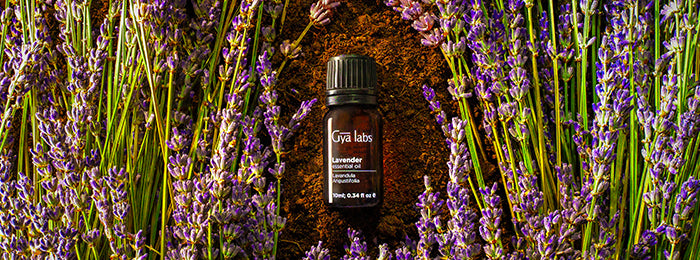
Lavender oil for anxiety is one the most popular aromatherapy remedies. Lavender aromatherapy is thought to calm the mind.
Scent Profile: Floral and herbaceous
3. Jasmine Essential Oil

Widely used in perfume making since the times of Cleopatra, Jasmine oil can have a calming effect on the mind. Its sweet scent can evoke feelings of romance and is a great scent to diffuse to get into the mood for loving moments with your other half.
Scent Profile: Floral and sweet
4. Basil Essential Oil

The phenol compounds in basil may be good for anxiety. In aromatherapy, the scent of basil is thought to calm the mind.
Scent Profile: Herbaceous and refreshing
5. Bergamot Essential Oil

A popular ingredient in perfumes and Earl Grey tea, Bergamot oil for anxiety has a zesty and uplifting scent that improves moods.
The oil comes from bergamot oranges and can be blended with lemon oil, rose essential oil, or rosemary oil. The essential oil can promote calmness and relaxation. It can be applied topically after mixing with almond oil.
Scent Profile: Sweet, tangy and citrusy
6. Roman Chamomile Essential Oil

Across cultures from the Greeks to Vikings, daisy-like chamomile was believed to heal the mind and body. In Rome, the flower’s aroma was used by soldiers to feel courageous before fights. Today it’s well known for its relaxing effects and pleasant aroma.
Scent Profile: Floral and herbaceous
7. Rose Otto Essential Oil

The scent of roses is known to soothe the senses. Treat yourself to a relaxing footbath with a few drops of Rose Otto oil.
Scent Profile: Sweet and floral
8. Vetiver Essential Oil
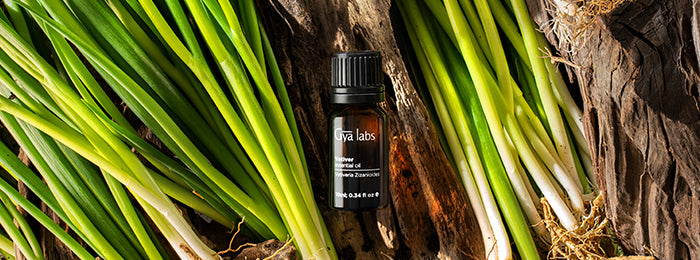
Vetiver oil’s aroma brings calm and centers you. This oil can be diffused in aromatherapy for relaxation.
Scent Profile: Earthy, smokey and woodsy
9. Ylang Ylang Essential Oil

Ylang Ylang oil is made from the tropical flowers of Cananga trees and has an exotic scent that’s great for relaxation. It is popularly used in aromatherapy to uplift moods and cultivate feelings of romance. If you need a Ylang Ylang substitue, Jasmine is definitely the closest you can get. But, if you don’t have Jasmine, either Rose, Neroli, or Geranium are close substitutes.
Scent Profile: Floral and sweet
10. Frankincense Essential Oil

Known for its spiritual benefits, Frankincense oil has a grounding scent. Made from the Boswellia Serrata tree, brave locals in countries like Somalia would travel on rugged mountains for just a few kilograms of its prized resin.
Scent Profile: Warm and woodsy with balsamic notes
11. Clary Sage Essential Oil

Clary sage oil is said to have gotten its unique, fresh scent from the Greek goddess of love, Aphrodite and possesses Clary sage spiritual benefits.
Scent Profile: Herbaceous and earthy with floral notes
12. Patchouli Essential Oil

Patchouli oil is used in Ayurvedic medicine to improve mental wellbeing. Patchouli is great on its own but is popularly combined with lavender to create moments of respite.
Scent Profile: Earthy, woodsy and herbaceous
13. Egyptian Geranium Essential Oil
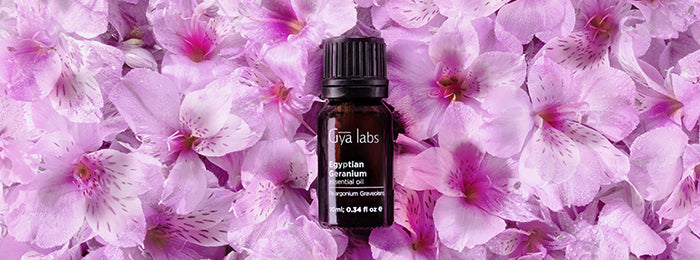
The Egyptians have long used geranium to beautify their skin for momentous occasions from weddings to great feasts. Today it’s often used as a scent in soaps, cosmetics, and perfumes.
Scent Profile: Sweet and floral with refreshing fruity notes
14. Marjoram Essential Oil

Marjoram oil is a perennial herb thought to have originated from the Mediterranean. It was often utilized by the ancient Greeks to treat many ailments as well as to crown young couples during wedding ceremonies. It’s still a popular option amongst aromatherapists.
Scent Profile: Minty, herbaceous and spicy
15. Fennel Essential Oil

An evergreen plant native to the Mediterranean, fennel was vastly used in culinary by the ancient Romans and Greeks for its rich flavors. In ancient China, fennel was also used as a treatment for snake bites. The aroma of fennel does have a satisfying effect on the mind.
Scent Profile: Sweet and peppery
16. Mandarin Essential Oil

Ancient Asian communities used Mandarin oil as a beauty elixir to fade scars. Today this calming citrus oil helps you relax.
Scent Profile: Sweet and citrusy
17. Mace Essential Oil
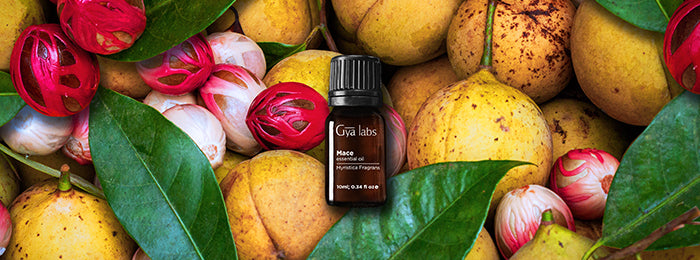
Native to the tropical rainforests of Indonesia, Mace oil is the outer seed covering of nutmeg. Traditional Arabians used mace for intermittent fevers, diarrhea, and insomnia, therefore mace essential oil is one of the effective essential oils to reduce fever in adults. Also, when inhaled before bedtime, this spicy oil relaxes the mind.
Scent Profile: Sweet and spicy
18. Ho Wood Essential Oil

A tall evergreen plant native to China, Ho Wood oil is made from the bark of the Ho Wood tree. It has been widely used by the Ancient Chinese to eliminate odors and also create a relaxing environment. It’s an earthy-scented bedtime must-have that promises to calm the mind.
Scent Profile: Earthy and floral
19. Spikenard Essential Oil

Exuding an earthy, calming scent, Spikenard oil is a cherished plant used in religious ceremonies to bring devotion, enlightenment, and deep inner peace to believers. It is also used in Nepalese tribes to heal the body and soul.
Scent Profile: Earthy and woodsy with musky notes
20. Vanilla Oleoresin Essential Oil

Vanilla was an ancient Aztec spice from Mexico but is now often used in baking and making delicious infusions. Vanilla Oleoresin oil is sweet and sensual, perfect for setting the mood for allowing you and your partner a romantic night.
Scent Profile: Creamy and sweet
21. Cilantro Essential Oil

Not to be confused with coriander, cilantro refers to the leaves on the coriander. Cilantro oil’s fresh and comforting scent is used for relaxation.
Scent Profile: Herbaceous, sweet and fresh
22. Sandalwood Essential Oil

Sandalwood oil is a holy symbol in Indian cultural practices often offered to the gods and goddesses. The result is a blessing of happiness to the worshippers. This woody helps calm the mind.
Scent Profile: Woody and earthy
23. Calamus Essential Oil

A plant with ancient origins dating back to 1300BC, Calamus has since been popularized in traditional Chinese and Indian remedies. Calamus oil also soothes the mind.
Scent Profile: Earthy, woody and spicy
24. Petitgrain Essential Oil

Petitgrain oil is derived from bitter orange trees that are loved by Spanish families for their many different uses. A single tree can yield ingredients for natural perfume, emotional healing and cooking. This oil is a mood-booster for smoother days ahead.
Scent Profile: Floral and woodsy
25. Cardamom Essential Oil

Cardamom was a treasured Scandanavian spice loved by Vikings. The spice is highly valued and might explain their remarkable talent for sailing across long trade routes without getting seasick. Cardamom oil is an incredible soother.
Scent Profile: Warm, spicy and slightly sweet
How To Use Essential Oils For Anxiety?

Topically
Using essential oils on the skin is a great but just make sure to dilute it with a skin-friendly carrier oil first! A good rule of thumb is 2 drops of essential oils to 1 tablespoon of carrier oil. Consider doing a patch test beforehand, to be on the safe side.
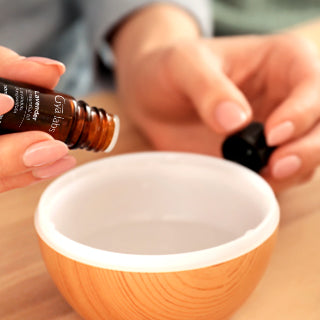
Diffuser
Diffusing essential oils is the easiest and most common aromatherapy method. Just add a few drops of essential oils into your diffuser and breathe in the benefits.

DIY
Make yourself a relaxing foot bath by adding Epsom salts and a few drops of essential oil into a bucket of warm water. Sit back, soak and relax.
How To Use Essential Oils Safely
Essential oils are great for self-care routines. However, we should also take care and follow caution when using them to keep ourselves and loved ones safe from its side effects. Generally essential oils are safe, but a few guidelines must be followed to avoid any adverse effects. Also, the oils are different, made up of different compounds. Some people may be allergic to certain compounds while others may be allergic to others. Concentrated oil must be bought after careful deliberation. Here are a few guidelines to keep in mind.
- Read the label and instructions to make sure you’re using the oil correctly.
- While buying essential oils be wary of the terms fragrance oil, perfume oil and natural identical oil.
- The term pure essential oil can be widely seen on the bottles. These maybe made from substandard sources.
- Ensure that you are not allergic to any ingredients or compounds in the oil.
- Make sure to dilute the essential oil in a carrier oil for safe application.
- Do not add too much of the oil in the diffuser.
- Avoid using essential oils of sensitive areas like the eyes and nose.
- Don’t apply it on broken skin either unless it’s mentioned on the bottle or label.
- Keep it out of reach of kids and fur kids.
- Do not diffuse the oil near kids and pets. Consult a doctor before doing so.
- Some oils may make you sensitive to sun damage, so be sure to load up on SPF.
- Check the label to see if the oil is photo-toxic.
- The oil may cause embryotoxicity; consult a doctor before use.
- Always do a small patch test before topical application.
- If aromatherapy is performed directly from the bottle, make sure that the oil does not touch the skin.
- The common unwanted effects caused by essential oils up on topical application are rashes, redness and swelling.
- Many ssential oils can trigger side effects. If you show signs of irritation, stop use and speak to a doctor before using essential oils.
- Some essential oils cannot be used by people with kidney problems, whereas some essential oils cannot be used by those with blood disorders. It is always advisable to consult a doctor about your essential oil needs and predisposition for diseases.

Frequently Asked Questions
Do essential oils work for anxiety?
Talk to a doctor or professional aromatherapist before using essential oils for anxiety.
What essential oil is good for anxiety?
Talk to a doctor or professional aromatherapist before using essential oils for anxiety.
What is the best essential oil for anxiety?
Lavender is the most popular scent, but it’s highly subjective to what you like best!
How to use lavender oil for anxiety?
You can dilute it with a carrier oil and rub it on your skin, diffuse it, or even just inhale its calming scent straight from the bottle. Talk to a doctor or professional aromatherapist before using essential oils for anxiety.
Where to apply essential oils for anxiety?
Talk to a doctor or professional aromatherapist before using essential oils for anxiety.
Essential oils can be applied on the handkerchief and bed sheets or pillow covers to lower anxiety. It can be applied on the clothes as well. But to get maximum effect, the oil must be applied and massaged on the wrists, back of the neck, temples, centre of the eyebrows and the feet.
What are some essential oils for dog anxiety?
Lavender, chamomile, sweet orange, sandalwood, frankincense, rose otto and bergamot are generally known to be dog-friendly and great choices to relieve anxiety in dogs.
Why Use Essential Oils to Reduce Anxiety and Panic Attacks?
Talk to a doctor or professional aromatherapist before using essential oils for anxiety.
Source:
- Farmacia 68(6):999-1010 (2020) Essential oils in wellness centers: Overview on european union legislation, potential therapeutic effects and toxicity https://www.researchgate.net/publication/348211025_Essential_oils_in_wellness_centers_Overview_on_european_union_legislation_potential_therapeutic_effects_and_toxicity
- William N. Setzer Natural Product Communications (2009) Essential Oils and Anxiolytic Aromatherapy https://journals.sagepub.com/doi/abs/10.1177/1934578X0900400928
- Nephrourol Mon v.8(5) (2016) The Effect of Aromatherapy on Anxiety in Patients https://www.ncbi.nlm.nih.gov/pmc/articles/PMC5111093/